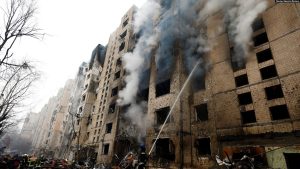Germany said on Monday it was prepared to back an immediate European Union embargo on Russian oil, a major shift from Moscow’s biggest energy customer that could let Europe impose such a ban within days.
Russia’s energy exports – by far its biggest source of income – have so far largely been exempt from international sanctions over the war in Ukraine. Kyiv says that loophole means European countries are funding the Kremlin war effort, sending Moscow hundreds of millions of euros every day.
Chancellor Olaf Scholz, who has been more cautious than other Western leaders in backing Ukraine, has been under growing pressure to take a firmer line, including from within the Social Democrat’s own governing coalition.
“Germany is not against an oil ban on Russia. Of course it is a heavy load to bear but we would be ready to do that,” Economy Minister Robert Habeck, of the Greens, told reporters before talks with his EU colleagues in Brussels.
“With coal and oil, it is possible to forgo Russian imports now,” Finance Minister Christian Lindner of the pro-business FDP told Die Welt newspaper. “It can’t be ruled out that fuel prices could rise.”
Germany had already reduced the share of Russian oil in its imports to 12% for 35% before Russia invaded Ukraine on February 24, but had previously said it needed months to phase out Russian crude to lessen the economic impact at home.
Russia-Ukraine | UNSG highlights the concerning impact of the war in Ukraine
Eastern parts of Germany in particular rely on fuel from a refinery owned by Russia’s state oil company Rosneft, served by the Soviet-era “Friendship” pipeline that runs thousands of miles to oil fields in Siberia.
Weaning Europe off Russian oil is likely to be easier than reducing dependence on Russian natural gas. Moscow has demanded European customers pay for gas in roubles, which the EU rejects. Last week, Moscow cut off supplies to Poland and Bulgaria. The EU ministers meeting on Monday discussed a joint response.
EVACUATION FROM MARIUPOL
The first civilians to be evacuated from a giant steel plant in Mariupol were expected to arrive on Monday in the Ukrainian-held city of Zaporizhzhia after an overnight bus journey across the front line.
Ukraine says hundreds of civilians have been trapped inside the Azovstal plant along with the city’s last Ukrainian defenders. Dozens were able to leave on Sunday in an evacuation organised by the United Nations, the first to escape since President Vladimir Putin ordered the plant barricaded last week.
Captain Sviatoslav Palamar, 39, a deputy commander of Ukraine’s Azov Regiment, told Reuters from inside the plant that fighters could hear voices of women, children and elderly people trapped below ground, and lacked the equipment to dig them out.
“We were planning to tear up the bunkers, the entrance to which is blocked, but all night into Monday naval artillery and barrel artillery were firing. All day today aviation has been working, dropping bombs,” Palamar said by Zoom.
Efforts to organise the evacuation of civilians from other parts of the city, now held by the Russians, ran into delays. Ukraine says 100 000 people are still living in the ruined city in desperate conditions after months of Russian siege.
“Our house is completely destroyed. We had a two-storey building, it’s not there anymore. It burned to the ground,” said Natalya Tsyntomirska, a Mariupol native who reached Zaporizhzhia on Monday in a funeral service van.
Russian-Ukraine | Civilians evacuated from Mariupol
After being forced to abandon an assault on Kyiv at the end of March, Russia has launched a major new offensive in eastern Ukraine. For its part, Kyiv hopes a massive influx of Western military aid will allow it to repel that assault and then turn the tide with a counter-attack.
The Russian offensive is focused on the eastern Donetsk and Luhansk provinces, parts of which were already held by Russian-backed separatists before the invasion. Russian troops are now trying to encircle a large Ukrainian force there, attacking from three directions with massive bombardment along the front.
Ukraine’s military said on Monday Russian forces were trying to take over the frontline Luhansk province town of Rubizhne,and prepare an assault on nearby Sievierodonetsk.
The heaviest clashes were taking place around Popasna, further south. Shelling was so intense it was not possible to collect the bodies, said regional Governor Serhiy Gaidai.
“I don’t even want to speak about what’s happening with the people living in Popasna, Rubizhne and Novotoshkivske right now. These cities simply don’t exist anymore. They have completely destroyed them.”
Russia has also been striking targets far from the frontline with missiles. The governor of Odesa in the southwest said the city was hit by a rocket that caused death and injury on Monday evening.
In Russia, two explosions took place on Monday in Belgorod, a southern region bordering Ukraine, governor Vyacheslav Gladkovsaid. The cause of the blasts was not clear but the Kremlin has accused Ukraine of making cross-border attacks. Gladkov said there were no casualties.
Ukraine does not generally respond to accusations it is behind attacks in Russia, but has described incidents there as”karma”. Kyiv also released footage on Monday which it said showed its drones destroying two Russian boats in the Black Sea.
Israel summoned Russia’s ambassador to demand an apology for remarks by Foreign Minister Sergei Lavrov, who, asked in an interview why Ukraine needed to be “de-nazified” when President Volodymyr Zelenskiy is Jewish, said “Hitler also had Jewish origins” and “the biggest anti-Semites are Jews themselves”.
Israeli Foreign Minister Yair Lapid called the remarks “the basest level of racism”.






